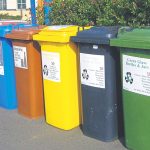Recycling made a significant contribution to the war effort during the World War II. Financial constraints and significant material shortages due to war efforts made it necessary for countries to reuse goods and recycle as much as they could.
These resource shortages caused by the world wars really encouraged a culture of recycling and ‘make do and mend’. The struggles during and after the war claimed much of the material resources available, leaving little for the civilian population.
 Recycling household materials meant more resources for war efforts and a better chance of victory.
Recycling household materials meant more resources for war efforts and a better chance of victory.
Extensive government promotion campaigns were carried out in every country involved in the war, urging people to donate metals and conserve fibre, as a matter of patriotism.
Today this seems to vary ridiculously across the UK.
Where you live not only affects your supply and cost of council services but also has an effect on your recycling regime.
Following recent reports in the media on what to do with your yoghurt pots we have been looking at different councils and the quite different rules they have in regard to what goes in what colour bin.
There are also regulations on whether you leave tops on bottles and what type of plastic is acceptable for recycling.
While all provide containers, some supply numerous bins, with Newcastle-under-Lyme holding the record at nine!
Others give just one bin and the staff sort by hand at the depot. This is mostly governed by the cost of using landfill and it seems crazy that there is not one budget for all.
In England alone there are 400 areas where what you are meant to do is different, which means that if you move to another location or even between work and home you have to learn a new set of rules.
 Problems also occur between members of the same household with items being put in the wrong bins which has to be re-sorted by the rubbish ‘monitor’.
Problems also occur between members of the same household with items being put in the wrong bins which has to be re-sorted by the rubbish ‘monitor’.
Hours of time must be wasted over the whole country. This could be one of the reasons why rates have peaked at 43% and may be in danger of falling, as re-cycling fatigue has kicked in.
In Scotland and Wales rates are increasing toward 70% recycling of domestic rates by 2025 and Wales is already on 54%. The reason is clear direction and standardised best practice for schemes.
English councils seem to be floundering in a mess of lack of direction and cohesion with only 24% of household recycling correctly.
There is not even a standard for collection intervals with fortnightly collections being used by the best performing councils, yet Eric Pickles is giving grants to councils who provide a weekly service.
It is vitally important that we get this right as European targets say we must recycle 50% of domestic waste by 2020 and the fines will outweigh the cost of a solution.
So what can we do individually? I have requested a leaflet from my local council and aim to do the best I can. Of course, there will always be difficulties with holidays and collection times clashing, visitors increasing the volume of my rubbish, the smell of food waste and the prevalence of rats and vermin enticed by the food.
Below are some tips from the website www.recycling-guide.org.uk.
To reduce contamination and improve recycling efficiency, wash and squash!
Wash
- Scrape out any food remains/pour away excess liquid.
- Rinse the container (use your washing-up water)
- Don’t put recyclables in the dishwasher – no need to waste resources to achieve an unnecessary level of cleanliness!
Squash
- Crush metal cans.
- Squeeze plastic bottles flat to expel as much air as possible.
Recycling should be a very high propriety and we must get it right as there is much more than money at stake here.
But please local governments give us a chance!
Have you got yours sorted yet is is it still a conundrum to you?
by Charlotte Corthold




